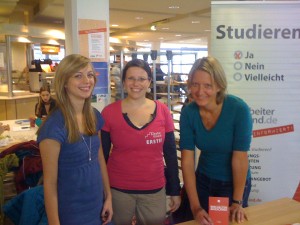We must be open to reform
Today I’m writing my last post for this blog. For two months we’ve been blogging about education in our home countries. I’ve learned a lot about education in other parts of the world, but also about the German system.
When talking about these subjects, I recognize a certain pattern: Often an education system’s performance is only evaluated by looking at the numbers of students who go on to get higher degrees or earn better marks – in other words, those who seem more prepared for the job market. But there is another factor that makes the educational system tremendously valuable to a society. And this factor is related to the discussion with my friend Katharina that I posted: Pre-schools and schools offer a very important opportunity to bring the members of a society closer together. Yet, Germany doesn’t fully seize this opportunity. On the contrary, the three-tiered school tracking system in many German states furthers the division of our society.
![]() read more
read more
Interview: Meeting disabled students’ needs
During the Global Media Forum (GMF), I met the students Hendrik and Isabelle who go to a school for physically impaired students. They participated in an exchange program between their school and a Tunisian school. Right now, Germany is talking a lot about the issue of education for the disabled because two years ago the UN Convention on the Rights of Persons with Disabilities went into effect – including in Germany. It stipulates that disabled children should attend so-called regular schools and should no longer be left out on the basis of their handicaps. As it stands now, the non-disabled have little contact with disabled students. Personally, I just have contact to an uncle of mine, who attended a regular school years ago, but today lives in a facility for the disabled and works in a factory with other workers with handicaps.
![]() read more
read more
A German-Tunisian exchange for handicapped students
After having spent three days at the Global Media Forum, my feelings remind me of those after a class trip or a big festival: I’m very exhausted but at the same time all wound up.
Emmy, María, and I have already talked a little about the discussions and workshops we participated in. Our entries show how different the workshops were. Some topics actually appeared to be too complex to be discussed in depth within 90 minutes. But I’ve got a lot of food for thought out of all of them; I’ve discovered new organizations, approaches and people. For example, the pupils Isabelle van der Valk and Hendrik Rösler who go to the Christophorus School for physically impaired children in Bonn. Their school organizes an awesome exchange program with a Tunisian school for kids with handicaps. This program enables the German students, on the one hand, to smell the salty air of the Mediterranean and the Tunisians, on the other hand, to see Germany at least once in their life.
![]() read more
read more
In favor of a critical approach to the digital world
Wow! I’ve found the Global Media Forum really interesting so far. The first thing that stood out to me was the diversity on display – people from lots of different countries mix at the conference, some in suits, some more casual or in business wear. There are lots of colorful dresses, men from Africa in robes and women in headscarves. The clothing is just an outer signal of how many cultures are represented here. And in the middle of it all are my fellow bloggers and me.
![]() read more
read more
The digital divide in education
Before I talk about paths other family members in my generation took in the German educational system, I want to come back to what my cousin Thorsten said in his interview: “The future of education is in Web.2.0.”
Many of the other bloggers and I have already written about this: No matter whether in Kenya or in Germany, technology opens new doors to education everywhere. But these don’t overcome old problems.
![]() read more
read more
“The future of education is in Web 2.0”
My family members have taken different paths through the German educational system. To offer you more insight, I interviewed my cousins and my brother. In my first interview, I’m speaking to my cousin Thorsten, 26, who went to school in Germany and Canada. He thinks schools should offer a broad-based education to further society’s cohesion.
![]() read more
read more
Financing university studies in Germany
In my last entry, I wrote about my motivation for founding the local chapter of ArbeiterKind.de in Mainz. Today I want to share some of the experiences I have had through my activities for this organization as well as those of my friends.
One statement comes immediately to mind for me:
“I didn’t tell them that I was receiving BaföG [educational loans and grants available from the state in Germany]. And I felt so terrible as they were criticizing ‘all of those cheaters who would steal money from the state’.”
![]() read more
read more
Recognizing the challenges of first-generation college students
Four years ago, I founded a local chapter of ArbeiterKind.de in Mainz, the city where I studied. The non-profit organization ArbeiterKind.de supports children whose parents didn’t attend university as they pursue college degrees. After I read an article about ArbeiterKind.de, I decided that I definitely had to support the organization for two reasons.
First, in the article Katja Urbatsch, the founder of ArbeiterKind.de, described the typical challenges for children of non-academic families after they finish high school. Many barriers seemed familiar to me: The insecurity about the value of studying certain subjects, like the humanities. A question I struggled with in the beginning was: Wouldn’t it be better to work and earn money immediately after high school? Later, the confusion arising from the task of writing initial academic papers was tough for me.
![]() read more
read more
Kathrin on Skype: “Kids should learn together longer”
Deficits in German music education
Hellgurd and Emmy wrote about how music is not always appreciated in Kenyan and Iraqi society. They made me think of an ironic quip from my former music teacher: “Yeah, I know, I’m only teaching a subsidiary subject of the lowest level.” But regardless of what he said, he’s a very dedicated teacher, who prepares school concerts and makes music himself.
Though I liked my teacher, I was frustrated by his music lessons. Since I didn’t play an instrument myself, my first time reading notes outside of a church service was during my music lessons with this teacher. I got the difference between high and low sounds, but defining triads?! It was all Greek to me. I guess I probably didn’t open up to his lessons and thus failed my first tests in music. I just didn’t get it. Why couldn’t we just sing a song together? Wasn’t that what music lessons were about?!
![]() read more
read more

















Feedback